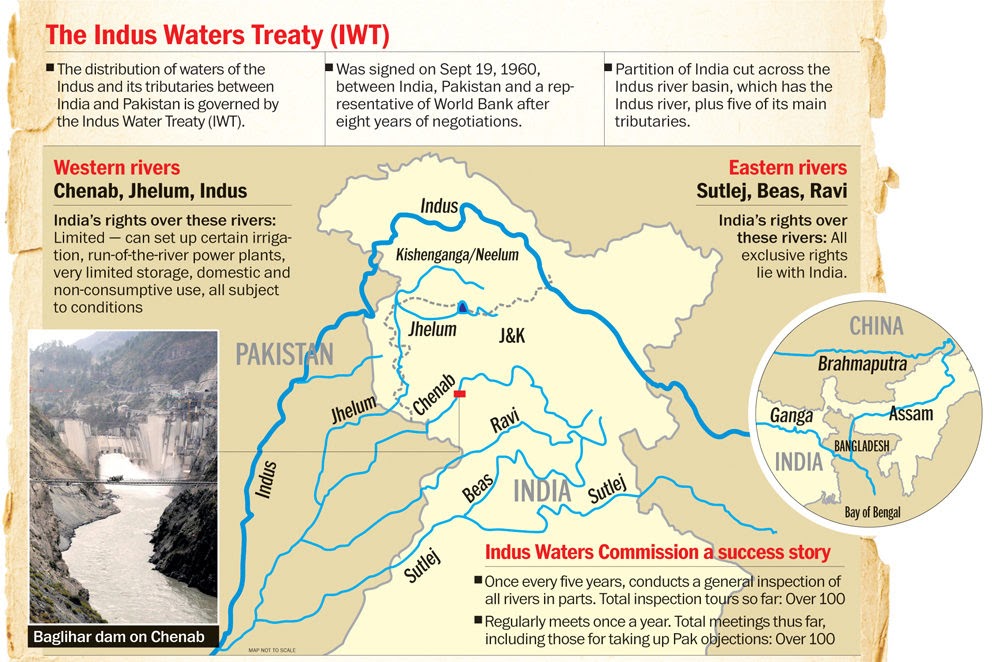



India rejected a Court of Arbitration ruling regarding its Kishenganga and Ratle projects, calling the court "illegally constituted" under the Indus Waters Treaty. India insists on the Neutral Expert mechanism for dispute resolution and has suspended treaty obligations, urging Pakistan to renounce terrorism before it considers resuming its commitments under the treaty.

Copyright infringement not intended
Picture Courtesy: TIMESOFINDIA
India rejected a Court of Arbitration ruling on the Indus Waters Treaty.
Signed in 1960 with the World Bank as a guarantor, the IWT governs the sharing of waters from the Indus River system between India and Pakistan.
Division of Rivers => The treaty allocates the waters of the three eastern rivers—Sutlej, Beas, and Ravi—to India for unrestricted use. The waters of the three western rivers—Indus, Jhelum, and Chenab—are allocated to Pakistan.
India's Rights on Western Rivers => While the western rivers are for Pakistan, India is permitted to use their waters for domestic purposes, agriculture, and generating hydroelectric power, provided the projects adhere to specific design and operational criteria.
Dispute Resolution Mechanism => The IWT has a structured, three-tiered mechanism for resolving disagreements:
 Copyright infringement not intended
Copyright infringement not intended
The current conflict originates from differing interpretations of this graded mechanism. India insists on following the sequence, starting with a Neutral Expert for what it considers technical issues. Pakistan, however, has often sought to directly approach the Court of Arbitration.
|
Kishenganga and Ratle Projects The dispute centers on two of India's hydroelectric projects in Jammu and Kashmir: the Kishenganga project on a tributary of the Jhelum and the Ratle project on the Chenab. In 2015, Pakistan requested a Neutral Expert for the Kishenganga and Ratle projects but then unilaterally sought to escalate the matter to a Court of Arbitration in 2016. India, maintaining that the issues are technical, has consistently pushed for the Neutral Expert mechanism. In a move that India protested, the World Bank in 2022 appointed both a Neutral Expert (at India's request) and a Court of Arbitration (at Pakistan's request). India has engaged with the Neutral Expert but has boycotted the CoA, deeming its establishment a violation of the IWT. |
India has formally rejected a recent "supplemental award" from the Hague-based Court of Arbitration, which asserted its jurisdiction over the dispute. The Ministry of External Affairs has labeled the court "illegally constituted" and its proceedings a "charade."
Following a terror attack in Pahalgam on April 22, 2025, India put its participation in the IWT in "abeyance." New Delhi has stated that the treaty will remain suspended until Pakistan takes credible and irrevocable action to end cross-border terrorism.
Pakistan has urged India to resume the normal functioning of the treaty, arguing that the CoA's ruling confirms the treaty's validity and that India cannot unilaterally suspend it.
Resume Commission-Level Talks => Resume the meetings of the Permanent Indus Commission (PIC) is crucial for the day-to-day management of the treaty and for maintaining a channel of communication, even amidst political tensions.
Structured Dialogue on Modernization => India should continue to press for a comprehensive review of the IWT, as it has formally requested. This dialogue should not be about scrapping the treaty, but about modernizing it to reflect current realities.
Delink Water from Terrorism => India's stance linking the treaty's suspension to cross-border terrorism sends a strong political signal, however, a long-term resolution requires delinking the technical and humanitarian aspects of water sharing from political disputes. This can be a phased process, with a resumption of treaty obligations tied to concrete counter-terrorism actions by Pakistan.
Incorporate Climate Change => The IWT, signed in 1960, does not account for the impact of climate change on river flows, glacier melt, and water availability. Any review must incorporate provisions for joint climate impact assessments and data sharing to manage the shared water resources sustainably.
Improve the Dispute Resolution Mechanism => The current deadlock over parallel proceedings by a Neutral Expert and a Court of Arbitration highlights the need for a more streamlined and unambiguous dispute resolution process. The graded approach favored by India should be clearly codified to prevent future legal impasses.
Optimize Water Use => India should continue to fast-track the development of hydropower projects on the Western Rivers, fully exercising its rights under the treaty. This includes building storage capacity as permitted, which is crucial for the development of Jammu and Kashmir and for India's overall energy security.
Expand the Treaty's Scope => A modernized treaty could include provisions for environmental water flows to sustain the river ecosystem, which has been severely damaged. It could also consider including other basin countries, like Afghanistan and China, in a broader framework for regional water cooperation.
Must Read Articles:
India Suspends Indus Water Treaty
Source:
|
PRACTICE QUESTION Q. "The Indus Waters Treaty (IWT) has been criticized for being overly generous to Pakistan, which receives 80% of the water from the Indus river system." Critically analyse. 150 words |





© 2026 iasgyan. All right reserved